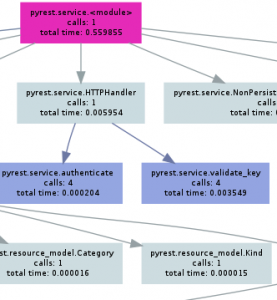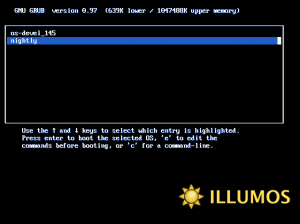September 9th, 2010 • 1 Comment
I’m a big fan of reporting be it reports form automated builds, coverages, API documents etc. To evaluate the python code I’m currently working on I needed Call Graph for Python. After some searching and testing I found this package to be most convenient: http://pycallgraph.slowchop.com/

P.S. If you are running Ubuntu (or similar) a sudo apt-get install python-pycallgraph will install the package. To create the graph simple call: pycallgraph –include=<whatever you need> <your app.py>
Categories: Personal, Work • Tags: Python • Permalink for this article
September 6th, 2010 • 1 Comment

Franz Josef Radermacher’s book about the current world situation with financial crises, natural disasters and exceeding resources not only describes the current and upcoming problems but also provides solutions towards what he calls an “eco-social market economy”. Beside the fact that the book is well written and quite short compared to the message it delivers, a good overview of what goes wrong and a possible way of solving it is presented. Only critical point would be that it doesn’t describe how we can get there. Still and definitely a book which you should read.
It describes that current established system can not solve the issue – needed is system which controls the free markets and ensure the social liability of our communities. Taxes on resources or a Supervisory Associations for financial markets which approve products before they can be sold are just one step in the right direction.
Categories: Personal • Tags: Books • Permalink for this article
September 1st, 2010 • Comments Off on Tinkering with Illumos
Honestly I do not really get the point why everybody is so upset about what happened to OpenSolaris. I can understand the steps Oracle took – and do not forget: The source is still under a CDDL license. A bit sad that the community doesn’t get real-time updates anymore.
On the other side I think that the initial idea of the Illumos project to replace the last closed source bits in ON is a good one. But I’m also looking forward to the Solaris 11 Express edition – I know some Solaris developers over at Sun/Oracle and those guys do a great job!
Here is a nice screen shot of Illumos booting BTW:

Categories: Personal, Work • Tags: OpenSolaris • Permalink for this article
July 8th, 2010 • Comments Off on My Kind Of Town (Chicago is) – Frank Sinatra
Now this could only happen to a guy like me
And only happen in a town like this
So may I say to each of you most gratef’lly
As I throw each one of you a kiss
This is my kind of town, Chicago is
My kind of town, Chicago is
My kind of people, too
People who smile at you
And each time I roam, Chicago is
Calling me home, Chicago is
Why I just grin like a clown
It’s my kind of town
My kind of town, Chicago is
My kind of town, Chicago is
My kind of razzmatazz
And it has all that jazz
And each time I leave, Chicago is
Tuggin’ my sleeve, Chicago is
The Wrigley Building, Chicago is
The Union Stockyard, Chicago is
One town that won’t let you down
It’s my kind of town
Another beautiful song which Frank Sinatra preformed was just called ‘Chicago’:
Chicago, Chicago–that toddlin’ town.
Chicago, Chicago–I will show you around. I love it.
Bet your bottom dollar you’ll lose the blues in Chicago, Chicago.
The town that Billy Sunday couldn’t shut down.
On State Street, that great street, I’d just want to say –
They do things they don’t do on Broadway.
They have the time, the time of their life.
I saw a man, he danced with his wife.
In Chicago, Chicago, my home town.
Chicago, Chicago–that toddlin’ town.
Chicago, Chicago–I’ll show you around. I love it.
Bet your bottom dollar you’ll lose the blues in Chicago, Chicago.
The town that Billy Sunday could not shut down.
On State Street that great street, I’d just like to say –
They do things that they never do on Broadway.
They have the time, the time of their life.
I saw a man, he danced with his wife.
In Chicago… Chicago… Chicago.
That’s my hometown!
To learn more about these songs Wikipedia has some decent entries about it: 1 2
Categories: Personal • Tags: Chicago • Permalink for this article
June 11th, 2010 • Comments Off on Running BES++ with Platform LSF
Prerequisite is an installed LSF cluster and a gsoap 2.7.10 installation (make sure that it is exact this version – newer version won’t work). Now check-out the BES++ sources:
svn co https://bespp.svn.sourceforge.net/svnroot/bespp bespp
Now edit the Make.config file and adjust the path to your gsoap installation. The attribute is called GSOAP_TOP and can be found in the first lines of the file. You might need to adjust the LSF_LOC and LSF_ARCH attribute as well – based on the system you use. Now simple run make and the two executable besclient and besserver will be created.
While you might up ending using SSL you need to create a simple CA (or go to http://cacert.org):
mkdir cert
/usr/lib/ssl/misc/CA.pl -newca # will initialize the CA
[...]
/usr/lib/ssl/misc/CA.pl -newreq # will create a cert request
/usr/lib/ssl/misc/CA.pl -sign # sign the request
cat newcert.pem newkey.pem > server.pem# create server pem
mkdir server/ && mv new* server/ # cleanup a bit
ln -s server.pem `openssl x509 -noout -hash -in server.pem`.0
./besserver -u <username> -h localhost -p 8443 -s <path>/cert/server.pem -c <path>/cert/ -g <username> -r lsf # run the besserver
Now to submit a simple job/activity with the besclient:
/usr/lib/ssl/misc/CA.pl -newreq # will create a cert request
/usr/lib/ssl/misc/CA.pl -sign # sign the request
cat newcert.pem newkey.pem > user.pem
mkdir user1 && mv new* user1/
besclient -x user.pem -e endpoint.xml create sleep.jsdl # runs the client
The enpoint.xml files looks like:
<?xml version="1.0" encoding="UTF-8"?>
<wsa:EndpointReference xmlns:wsa="http://www.w3.org/2005/08/addressing">
<wsa:Address>https://localhost:8443</wsa:Address>
</wsa:EndpointReference>
The sample sleep.jsdl file looks like:
<?xml version="1.0" encoding="UTF-8"?>
<JobDefinition xmlns="http://schemas.ggf.org/jsdl/2005/11/jsdl">
<JobDescription>
<JobIdentification>
<JobName>Sleep</JobName>
</JobIdentification>
<Application>
<HPCProfileApplication xmlns="http://schemas.ggf.org/jsdl/2006/07/jsdl-hpcpa">
<Executable>sleep</Executable>
<Argument>60</Argument>
<Output>/dev/null</Output>
<WorkingDirectory>/tmp</WorkingDirectory>
</HPCProfileApplication>
</Application>
<Resources>
<TotalCPUCount>
<Exact>1</Exact>
</TotalCPUCount>
</Resources>
</JobDescription>
</JobDefinition>
Note: it might be necessary to add your CA to the /usr/lib/ssl/ directory as symbolic link…
Categories: Personal, Work • Tags: LSF • Permalink for this article


